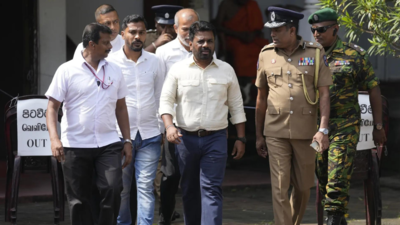
Sri Lanka is headed for a crucial parliamentary election on November 14, called by President Anura Kumara Dissanayake. His National People’s Power (NPP) party seeks a majority in the 225-seat legislature to implement anti-poverty and reform initiatives. This vote occurs as Sri Lanka continues to recover from its severe financial crisis that resulted in the removal of former President Gotabaya Rajapaksa in 2022.
As Dissanayake triumphed in September, securing 42% of votes, the election became essential as Dissanayake had only three parliamentarians in the outgoing assembly, which was set to conclude in August 2025 and now needs 113 seats to implement his policies. The election involves 17.1 million eligible voters and over 8,800 candidates.
The NPP, founded in 2019, is a newcomer among Sri Lanka’s traditional parties, many of which have long been dominated by family dynasties. Dissanayake’s party competes against Sajith Premadasa’s United People’s Power (Samagi Jana Balawegaya), which came second in the presidential race. The splintered opposition is reportedly struggling to regain ground following their losses, with many veteran politicians from the former ruling party, the Sri Lanka Podujana Peramuna (SLPP), choosing to sit out the election.
Key issues and economic challenges
The vote is being closely watched, not just for its political implications but also for its potential impact on Sri Lanka’s fragile economic recovery. The country is implementing a $2.9 billion bailout program from the International Monetary Fund (IMF) after defaulting on its external debt in 2022. This crisis, fueled by economic mismanagement, tax cuts, and the fallout from the COVID-19 pandemic, resulted in hyperinflation, foreign currency shortages, and a collapse in tourism, which is a major revenue source.
President Dissanayake’s campaign focused on revisiting the IMF deal, though he has since committed to its terms. While he initially promised to reduce high income taxes imposed under the program, his focus has shifted to balancing economic stability with pro-poor policies aimed at reducing income inequality. Investors are watching closely, with concerns that renegotiating the IMF terms could stall future disbursements and disrupt the country’s progress toward a primary surplus target of 2.3% of GDP by 2025.
A divided opposition and the potential for change
If the NPP secures a parliamentary majority, it will mark the first time a leftist, Marxist-leaning coalition takes control of both the presidency and parliament in Sri Lanka. This outcome could lead to a dramatic shift in policy-making, potentially ushering in a more socialist approach to governance. Dissanayake’s stance against traditional political corruption and his focus on reforming welfare policies resonate with a public that is weary of the country’s long-standing political elites and recent economic hardships.
On the other hand, a failure to secure a majority could leave Dissanayake relying on coalition partnerships, which may complicate his reform efforts and reduce the likelihood of swift policy changes. Opposition leader Premadasa has vowed to pressure Dissanayake to uphold promises of tax relief, while the conservative New Democratic Front, led by supporters of previous President Ranil Wickremesinghe, remains a contender.
Subdued elections
With a decisive cabinet expected to form as early as Friday, and the new parliament convening on November 21, Dissanayake will likely use the throne speech to outline his administration’s core policy priorities. The election is expected to be less contentious and more subdued than previous ones, partly due to the opposition’s weakened position and low enthusiasm for traditional parties.
Dissanayake’s potential victory would also likely continue to realign Sri Lanka’s international relationships. Given Sri Lanka’s recent reliance on foreign aid, Dissanayake’s administration may seek new avenues for economic partnership, potentially increasing cooperation with both China and India.





































